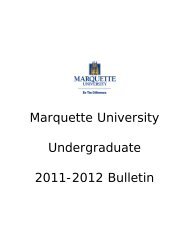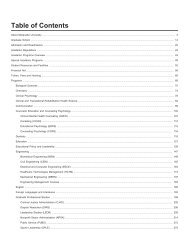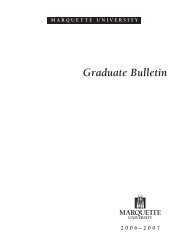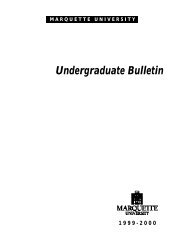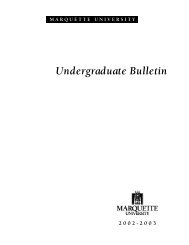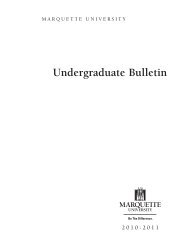2012-2013 - Marquette University Bulletin
2012-2013 - Marquette University Bulletin
2012-2013 - Marquette University Bulletin
You also want an ePaper? Increase the reach of your titles
YUMPU automatically turns print PDFs into web optimized ePapers that Google loves.
<strong>Marquette</strong> <strong>University</strong> - Graduate School of Management <strong>Bulletin</strong> 61<br />
Economics<br />
Chairperson: Dr. Abdur Chowdhury, Ph.D.<br />
business.marquette.edu/academics/msae<br />
Degree Offered<br />
Master of Science in Applied Economics, Plan B Professional Project option only.<br />
Program Description<br />
The master of science program in applied economics is designed for individuals seeking careers as economics, financial or marketing<br />
analysts in business, industry, government or the financial sector. The program provides students with the solid grounding in economic<br />
theory and the working knowledge of advanced quantitative methods needed to succeed as business economists, financial analysts,<br />
economic and marketing researchers, government staff economists or economic consultants. The program concentrates on developing<br />
and applying practical skills which can be used to solve real problems confronting business and government. The curriculum is designed to<br />
produce practitioners who can develop and interpret economic models. Courses emphasize the application of economic theory and the use<br />
of quantitative techniques rather than the derivation of their theoretical underpinnings. Communication skills are stressed through frequent<br />
written and oral presentations of results from applied research projects.<br />
Prerequisites for Admission<br />
Applicants are expected to have a four-year baccalaureate degree with at least one course in each of the following areas: intermediate<br />
microeconomic theory, intermediate macroeconomic theory, statistical methods and calculus. Familiarity with personal computers is also<br />
required.<br />
Specializations<br />
Business Economics, Financial Economics, International Economics, Marketing Research, Real Estate Economics<br />
A general plan, requiring no specialization, is also available.<br />
Application Requirements<br />
Students may apply for Regular Degree, Temporary Degree or Non-degree status. It is recommended that students apply for Regular<br />
Degree Status when possible. The application is online via our website at marquette.edu/gsm. Then click on Apply Now.<br />
1. A completed application form and fee.<br />
2. Official transcripts from all current and previous colleges/universities except <strong>Marquette</strong>.<br />
3. Three letters of recommendation from former professors.<br />
4. GRE scores or GMAT scores.<br />
5. (For international applicants only) a TOEFL score or other acceptable proof of English proficiency.<br />
All application materials should be sent to: Graduate School of Management; David A. Straz, Jr., Hall Executive Center, Suite 275;<br />
<strong>Marquette</strong> <strong>University</strong>; P.O. Box 1881; Milwaukee, WI 53201-1881.<br />
Note: Temporary non-degree applicants (admission valid for one term only) must submit all of the above except the GMAT or GRE scores.<br />
Students are encouraged to complete all application materials and apply for degree status. Temporary status is valid for one semester<br />
only. Temporary non-degree status students are not eligible to continue taking classes beyond one semester without degree admission.<br />
Temporary non-degree status is not available to international students. International applicants must apply for regular degree admission<br />
status. Typically, non-degree admission is not recommended in the economics program.<br />
Economics<br />
The program requires a minimum of 30 credit hours of course work (at least 15 of which must be in 6000-level graduate courses), a noncredit<br />
master’s professional project and an oral comprehensive examination.<br />
For students completing a specialization, course work will include: 12 credit hours of required core courses in economic theory and<br />
quantitative analysis, 12 credit hours of course work relating to a chosen area of specialization and six credit hours of electives.<br />
Specializations include: business economics, financial economics, international economics, marketing research and real estate economics.<br />
A general plan (no specialization) is also available. General plan students must complete the 12 credit hours of required core courses,<br />
12 credit hours of economics electives and six additional credit hours in economics, business or the social sciences. With the approval<br />
of the program director and appropriate extra work of graduate caliber, a student may apply toward the degree up to six credit hours of<br />
selected 5000-level upper division courses. Also, with the approval of the program director, a student may substitute, for the usual elective<br />
requirements, up to six credit hours of course work in fields outside of economics and business administration.



